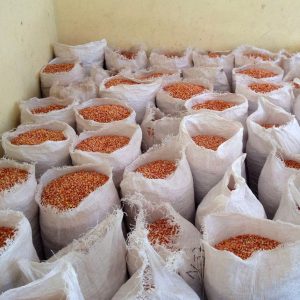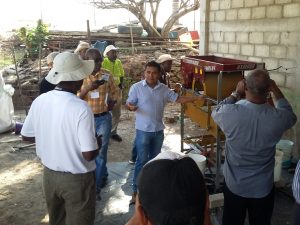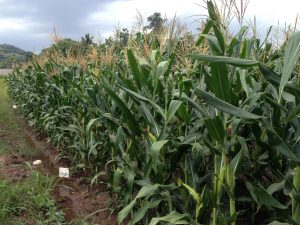
EL BATAN, Mexico (CIMMYT) – Haiti’s farmers are benefiting from improved maize seed as part of a project developed to help kick-start the local seed sector and reduce dependence on international aid and imports.
Half of the Haitian population lives on less than $1.25 a day, and half of their food is imported, leaving them vulnerable to food price rises. Haiti receives $20 million per year in food assistance from U.S. Agency for International Development (USAID) collaborations alone. Because of the lack of inputs, fragile infrastructure and soil erosion, most farming is subsistence in nature and kept in check by droughts and seasonal storms.
Until good-quality improved seed is available in Haiti, farmers will struggle to surpass yields of one ton per hectare, and most will settle for much less. “In order to be sustainable, you need seed systems and it needs to be a business,” said Arturo Silva, leader of the Haiti Mayi Plus project, led by the International Maize and Wheat Improvement Center (CIMMYT) with funding from USAID.
Bringing back Hugo
A very popular quality protein maize variety was introduced to Haiti 10 years ago by CIMMYT researcher Hugo Cordova. Haitian farmers know it as “Hugo,” but after a decade without a functioning system to guarantee that varieties are reproduced with the same genetic characteristics, the seed found in Haitian markets is no longer worthy of the name. Currently, there are only two formally-registered private seed producers in Haiti.
CIMMYT’s first task is to restore Hugo to its former glory by providing four tons of basic seed to be scaled up into commercial seed for use in Haiti. Although Hurricane Matthew destroyed 1.5 tons of this store in October, the project is still on track to surpass targets due to success elsewhere.

In February 2016, eight people from Haitian seed enterprises, rural development groups and the Ministry of Agriculture travelled to the State of Oaxaca, Mexico, for a training course in seed production.
The training was so successful that, with 30 kilograms of foundation seed provided by CIMMYT, nearly four tons of basic Hugo seed will be produced in Haiti. Additionally, trainees passed on their newly acquired knowledge to around 30 farmers with the potential to become seed producers themselves.
From just over one ton of basic Hugo seed planted it will be possible to produce 140 tons of commercial seed for farmers, enough to plant 7,000 hectares of farmland in the area targeted by the project in southwest Haiti.
The return of Hugo is a quick win as a variety that farmers already know and trust. If farmers in target areas combine the new seed with good planting practices and fertilizer, they should be able to double their yields, at the very least.
Towards maize self-sufficiency in Haiti
An agricultural transformation can only occur as other obstacles facing Haiti are overcome. For now, CIMMYT, building on the work of USAID with its partners, is showing how a local seed sector can quickly be developed.
“We can have an impact in Haiti, but our focus is for this impact to be that they have people well-trained in quality seed production with the criteria of cutting dependency,” said Alberto Chassaigne, CIMMYT specialist in maize seed systems.
CIMMYT is working with local centers for rural development (CRDDs) to determine farmers’ needs, raise awareness of farming practices and identify those with the potential to become seed producers. CIMMYT donated a small seeder to the University of Quisqueya in Haiti’s capital, Port-au-Prince, and student trials are underway to investigate how to improve cropping intensity in farmers’ fields.

Looking to the future, studies are being conducted in Haiti to produce even better open-pollinated varieties (OPVs) and high-yielding hybrids that will allow an emerging local seed sector to take maize farming in Haiti to another level. The specialized genetics of hybrid maize yield more than OPVs when well fertilized, but must be produced using special protocol. CIMMYT’s partners in Haiti will be instrumental in creating a cultural change among farmers to see the value in paying for better seed and inputs.
“I believe that if we can have an impact in Haiti, with all the challenges it faces, there is no other country in Mesoamerica that can say it can’t be done there too,” said Chassaigne. “I work with very proactive, dedicated people who want to help their country; without them we will not achieve anything.”
 Nutrition, health and food security
Nutrition, health and food security